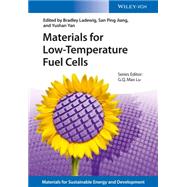
Note: Supplemental materials are not guaranteed with Rental or Used book purchases.
Purchase Benefits
What is included with this book?
Associate Professor Bradley Ladewig is an academic in the Department of Chemical Engineering at Monash University, Australia, where he leads a research group developing membrane materials and technologies for clean energy applications. He has a wide range of experience as a chemical engineering researcher, including in membrane development for direct methanol fuel cells, testing and modeling of combined heat and power PEM fuel cell systems, and desalination membrane development. Recently he has worked on several collaborative projects in the field of direct carbon fuel cells, metal organic framework materials as gas sorbents and membrane components, and low-cost microfluidic sensors based on paper and thread substrates. He is a Fellow of the Institution of Chemical Engineers.
Professor San Ping Jiang is a professor at the Curtin Centre for Advanced Energy Science and Engineering, Curtin University, Australia and Adjunct Professor of the Huazhong University of Science and Technology, China. He also holds Visiting/Guest Professorships at Wuhan University of Technology, University of Science and Technology of China (USTC), Sichung University, and Shandong University. Dr. Jiang has broad experience in both academia and industry, having held positions at Nanyang Technological University, the CSIRO Manufacturing Science and Technology Division in Australia, and Ceramic Fuel Cells Ltd (CFCL). His research interests encompass solid oxide fuel cells, proton exchange and direct methanol fuel cells, and direct alcohol fuel cells.
Professor Yushan Yan is Distinguished Engineering Professor in the Department of Chemical and Biomolecular Engineering at the University of Delaware. Prior to that he was a Professor at The University of California, Riverside, and before that worked for AlliedSignal Inc. as a Senior Staff Engineer and Project Manager. His research focuses on zeolite thin films for semiconductors and aerospace applications and new materials for cheaper and durable fuel cells. He is co-Founder and Director of the start-up companies Full Cycle Energy and Zeolite Materials Solutions (ZSM).
The New copy of this book will include any supplemental materials advertised. Please check the title of the book to determine if it should include any access cards, study guides, lab manuals, CDs, etc.
The Used, Rental and eBook copies of this book are not guaranteed to include any supplemental materials. Typically, only the book itself is included. This is true even if the title states it includes any access cards, study guides, lab manuals, CDs, etc.